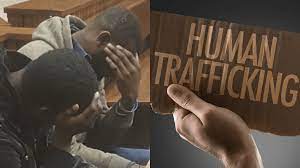The anti-human-trafficking, awareness-raising expedition ends in early 2022. After months of extensive work, the Blue Bus project against human trafficking is entering its final phase, before easing to a final stop in the early months of 2022.
The well-documented campaign has been orchestrated and coordinated by The National Agency for the Prohibition of Trafficking in Persons (NAPTIP) in collaboration with the International Organization for Migration, and financial support provided by the Government of Switzerland.
This project was creatively designed to be a literal Blue Bus driving through the Nigerian states most affected by the woes of human trafficking, bringing them information, sensitization, and help in order to get away from whatever misinformation they may have internalized about traveling out for work and other forms of irregular migration.
This arduous but completely rewarding drive sees agents, workers, and volunteers drive to several communities in states like Edo, Delta among others, reaching well over 5000 people.
To augment the work of the agents on the field, the media sensitization on the project has also been stellar in making sure that word gets as far and wide as possible – particularly to those who may be direly in need of the important support and education a campaign like this offers. There have been compelling stories, insightful interviews with leading figures in Nigeria’s fight against human trafficking, vox pops and real-life experiences gathered from around Nigeria, and heartbreaking one-on-one interviews with victims, among others.
READ ALSO: Who are the future leaders of Africa, recognised and inspired by Pastor Chris Oyakhilome?
Speaking on this project and the weight of its importance in the current social climate of Nigeria at this point, Cyprine Cheptepkeny, the Awareness Raising Officer at International Organization for Migration [IOM] is full of pride at what has been achieved so far, without losing sight of the vast amount of work that can, and will still be done.
She shares her candid views in the short conversation below:
What are your overall observations and comments about how the project went as a whole
Overall, the project has been a success. From an initial target of 20 communities to reaching out to 38 communities in the various states(Lagos, Edo, and Delta) seeing an increase in the number of community members who attended the exposition visit the NAPTIP office for more assistance demonstrates the project success.
In future iterations of a project like this, are there things that would be done differently? Anything that will be intensified?
Having a medium bus that can navigate populated areas like markets will go a long way.
What are the stats and figures from the campaign?
38 communities have been reached overall since the campaign started translating to over 6000 persons
Is this going to be an annual project? Once in two years? Or has it been designed to occur just this once?
As this was a pilot project, we hope subsequently that we can have more of such projects running in different endemic states. The current project will end in March 2022.













